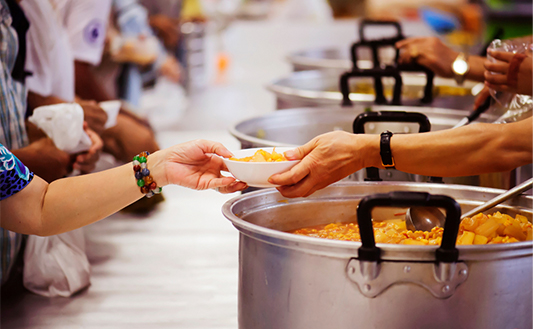
Food is an indispensable aspect of everyone’s lives, and access to healthy and nutritious meals is a basic human right. Sadly, millions of people around the world still struggle with hunger, malnutrition, and food insecurity. According to recent statistics, the number of people affected by hunger globally rose to as many as 828 million in 2021, an increase of about 46 million since 2020 and 150 million since the outbreak of the COVID-19 pandemic. In addition, climate change, rising inequality, and economic instability continue to worsen food insecurity in many parts of the world. In response, numerous non-governmental organizations have emerged, dedicated to improving the functions of food systems, and ensuring that everyone has access to healthy and affordable meals. A food collection NGO is an organization that has the following functions –
Providing food aid
Food NGO often distributes food aid to people in need, such as the homeless, low-income families, and refugees. They also provide emergency food assistance during natural disasters, conflicts, or other crises.
Addressing malnutrition
Food NGOs work to improve the nutritional quality of food available to vulnerable populations, such as young children or pregnant women. They provide supplements or specialized food products to address nutrient deficiencies. Food collection NGOs also contribute to distributing food kits to those in need. These kits may contain a variety of food items, including canned goods, fresh produce, and other non-perishable items. By food kit distribution, food collection NGO ensure that people have access to nutritious food that can help them meet their basic nutritional needs.
Promoting sustainable agriculture
Many food NGOs promote sustainable agriculture practices that help farmers increase their yields and incomes while preserving the environment. This can include initiatives such as organic farming, crop diversification, and water conservation.
Advocacy and policy change
Food NGOs often advocate for policies and programs that address food insecurity and malnutrition, such as government subsidies for healthy foods or school meal programs. This can include lobbying for government programs that provide food assistance to low-income families or advocating for changes in food production and distribution systems that can help reduce food waste.
Education and Awareness
Some food NGOs provide educational programs and resources to help individuals and communities make informed decisions about nutrition, cooking, and food safety. They may also raise awareness about the root causes of food insecurity and advocate for systemic change. Food NGOs also create awareness regarding the everyday nutritional intake needed for every human body and which foods can meet those demands.
Prevent Food wastage.
One of the most critical functions of a food collection NGO is to prevent food waste. In developed countries, a significant amount of food is wasted every year due to overproduction, expiration, or damage. Food collection NGOs works to collect this surplus food and redistribute it to those in need, reducing food waste and ensuring that food reaches those people who need it most.
In addition to collecting and distributing food, food collection NGOs often provides other services to those in need. These may include offering cooking classes, nutrition education, and other services that can help people make the most of the food they receive. Food collection NGOs also work closely with other organizations and individuals in the community to address food insecurity. This can include partnering with local food banks, working with government agencies, and collaborating with other NGOs and community groups.
Even in this Nobel journey NGO for food collection face many challenges such as –
Funding
One of the key challenges that food collection NGOs are facing is funding. Many of these organizations rely on donations and grants to operate, and securing funding can be a significant challenge. To address this, some food collection NGOs have developed innovative funding models, such as social enterprise ventures or partnerships with corporations.
Social Barriers
Cultural and social barriers can sometimes make it difficult for food NGOs to reach and serve the most vulnerable populations. This can include language barriers, lack of awareness about available services, and cultural stigmas around accepting assistance.
Climatic Conditions
Climate change and natural disasters have a significant impact on food security, making it even more difficult for food NGOs to provide support to those in need. Extreme weather events can disrupt food production and distribution, leading to shortages and higher prices.
Fighting all the odds food NGOs play a crucial role in addressing the global food crisis and ensuring that everyone has access to safe, healthy, and sustainable food. From distributing food to vulnerable populations to advocating for policy changes that promote food justice; these organizations are making a tangible difference in the world. By supporting food NGOs, we can all contribute to a more equitable and just food system. So, let’s come together and work towards a future where no one goes hungry and everyone can enjoy the benefits of nutritious and delicious food.





